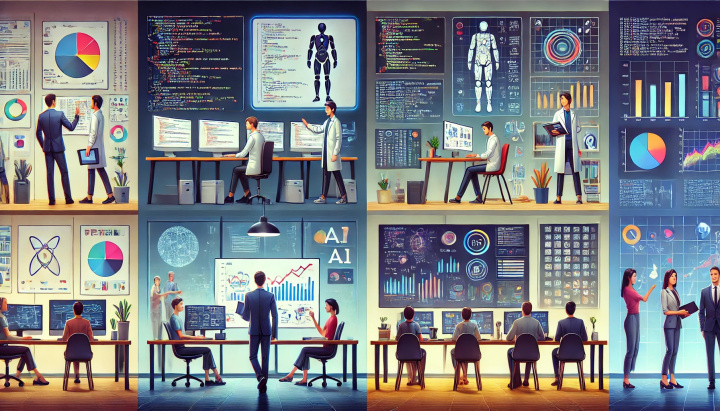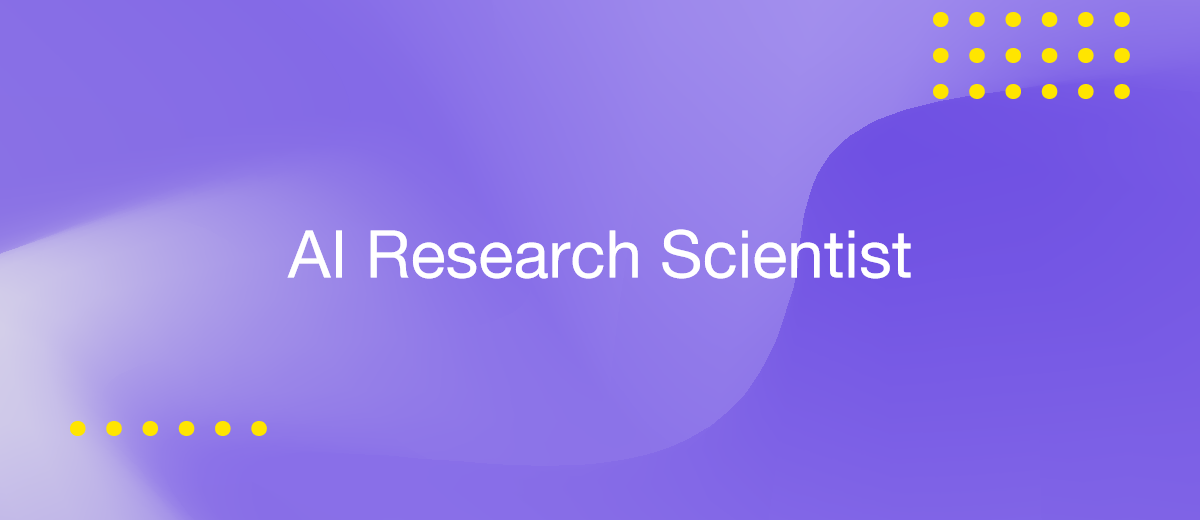AI Research Scientist: Pioneering the Future of Technology
In the context of rapid technological progress, the role of a scientific researcher in the field of artificial intelligence is becoming increasingly important. This profession provides an opportunity not only to work with advanced algorithms and complex systems, but also to pave the way into unexplored areas of science and technology. Its representatives are at the forefront of developing new technologies that can change our understanding of the future. From this article, you will learn how to become an AI research scientist and what such a specialist does. Those who are seriously interested in this field of activity will find it useful to learn about its prospects and the challenges that will have to be faced in the process of working.
Profession Overview
The work of an AI research scientist is related to research and development in the field of artificial intelligence. These specialists work to expand the capabilities of AI systems by studying them, conducting experiments, and implementing innovations. Their professional interests touch upon various areas of AI, including natural language processing (NLP), machine learning (ML), robotics, and computer vision. They most often work in research labs, academic institutions, and in industry, implementing AI and ML algorithms into business processes.
AI researchers are part of a new generation of computer scientists who teach and develop artificial intelligence technologies. They are responsible for designing, implementing, and analyzing the performance of AI systems, tailoring them to the needs of companies and organizations. AI researchers are in high demand across many industries and fields, including construction, retail, marketing, banking and financial services, healthcare, automotive, and more.

Today, there are several types of AI research scientist jobs. The main ones are:
- Theoretical researcher. Theoretical scientists study the mathematical and logical foundations of artificial intelligence. They work on developing abstract concepts, creating new algorithms and models for AI systems. They typically have solid experience in mathematics, computer science, and statistics.
- Applied AI researcher. These specialists develop artificial intelligence technologies to solve practical problems and tasks. They adapt theoretical developments to create systems for natural language processing, image recognition, autonomous vehicle navigation, and other processes.
- Machine learning engineer. Researchers in this field specialize in developing, training, and implementing machine learning models. ML engineers collect and process large amounts of data, training algorithms for classification, clustering, forecasting, and other actions.
- AI ethics researcher. Researchers in this specialization study the moral implications of AI applications and are responsible for upholding these principles. They address issues such as bias, transparency, accountability, and the social impact of AI.
- Robotics researcher. Professional interests for these scientists represent artificial intelligence and robotics technologies, or rather their combination. They develop programs for AI-based robots that allow them to make decisions, perform tasks, and interact with the environment.
The salary of an AI research scientist varies depending on numerous factors: the field of research, experience, location, and responsibilities. The average salary of such specialists in the US is about $137,000 per year. Most vacancies for the position of data scientist contain an offer of $100–110 thousand per year. Computer and information systems managers who lead research groups can expect a higher salary – at the level of $160–165 thousand per year.
Key Competencies and Skills
If you are seriously interested in AI research and want to do it professionally, you can start collecting information on how to become an AI research scientist. First, pay attention to the skills and competencies that such a specialist must have.
To successfully master this promising specialty, applicants must have deep technical knowledge, analytical skills, and a creative approach to problem-solving. The most important competencies are:
- Mathematics and statistics. AI researchers need a solid background in the hard sciences. They should focus primarily on linear algebra, calculus, statistics, and probability theory. This knowledge and the ability to apply it are considered fundamental to understanding and designing algorithms, as well as modeling and interpreting complex data.
- Programming. Knowledge of a number of programming languages (Java, Python, R, Scala) is significant for these specialists. In addition, they need to have a good understanding of machine learning frameworks and libraries, such as PyTorch and TensorFlow. All this allows them to experiment and implement AI and ML models, as well as process large data sets.
- Research and analytical skills. The profession requires the ability to plan experiments, test hypotheses, and analyze results. Analytical thinking helps find non-standard solutions to complex problems and create innovations, constantly improving AI technologies.
- Critical thinking and creative problem-solving. AI researchers must continually seek new approaches to solving AI issues and critically evaluate the conclusions they reach.
- Communication and collaboration skills. AI research projects often involve interdisciplinary teams. This requires effective communication from all participants. These skills help to articulate ideas and concepts, convey information, and collaborate effectively with all stakeholders.
Responsibilities
An AI researcher performs many important tasks aimed at developing and optimizing AI and ML technologies. The AI research scientist job description looks like this:
- Designing and conducting experiments to test hypotheses in different areas of AI.
- Collaborating with other researchers and engineers to implement and adapt AI technologies for practical applications.
- Development of algorithms and models for solving various issues of machine learning and artificial intelligence.
- Writing articles and reports on research results, preparing publications in scientific journals, and reports at conferences, and more.
- Creation of prototypes and test systems to demonstrate research results.
- Studying the latest developments and trends in AI and ML.
- Discussing concepts and research results with stakeholders, sharing experiences with colleagues, and communicating with non-technical audiences.
- Engaging with ethics boards to ensure that AI research complies with ethical standards and social norms.
- Collaborating with businesses to implement research results into products and processes.
This list of duties will give you a general idea of what an AI research scientist does. Perhaps specialists do not do everything listed daily. However, as you have already seen, there will be more than enough work. If this has not stopped you, we suggest that you familiarize yourself with the problematic aspects accompanying the profession.
Key Challenges in AI Research
The work of an AI research scientist involves a number of complex and multifaceted issues that require in-depth analysis and innovative thinking. These challenges range from technical aspects (development and optimization of algorithms) to broader issues, including the ethical and social implications of AI. Understanding and overcoming these challenges is critical to the successful advancement of technology and its safe implementation in various fields.

The key issues that professionals in this field face and that shape their daily work are:
- Ethics and morality. Moral and ethical issues related to bias, privacy, transparency, and accountability of artificial intelligence systems are controversial. The fairness of the decisions they make is also considered controversial. These issues become especially acute when AI is introduced into the areas of public administration, justice, and healthcare.
- Integration. Implementing AI systems into established business processes requires fine-tuning and adaptation to ensure compatibility with specific solutions and scenarios. At this stage, problems with data compatibility, change management, and staff training often arise.
- Computing power. This metric is crucial for the development and implementation of AI and ML systems, especially those involving large data sets and complex calculations. The growing capabilities of algorithms and models require devices with higher performance. The main challenges in this area concern their cost, scalability, and energy consumption.
- Data security and privacy. This major challenge in AI research is the need to protect data and ensure its privacy. Access restrictions, encryption technologies, and regular audits help minimize the risk of leaks, hacks, and misuse of information.
- Transparency. It helps to build trust with the audience and make AI and ML algorithms accountable to users. Transparency is achieved by clearly documenting data sources, model training methodologies, and their performance metrics.
- Difficulty of understanding. Lack of transparency makes it difficult to understand and explain how AI systems work. Users’ lack of understanding of how algorithms form their conclusions and recommendations creates mistrust and limits their adoption.
Prospects and Opportunities
The artificial intelligence continues to develop at an incredible rate, opening up new horizons in various fields. Innovative achievements in the field of AI are already beginning to transform business processes, medicine, transportation, and many other areas. It is important for a person planning to engage in research in this field to understand the prospects and potential opportunities that this dynamic sector offers.
Key AI technology trends that will accompany the development of the industry in the near future:
- Multimodal systems. One of the most relevant trends for AI and ML concerns the development of multimodal models capable of receiving and processing several types of data. This significantly expands their capabilities, allowing them to quickly switch between natural language processing, image generation, computer vision, and other tasks.
- Small-sized models. A gradual transition from resource-intensive commercial models with trillions of parameters to compact open-source systems is predicted. The ability to run locally on small devices can make AI and ML technologies more accessible and convenient for the mass user.
- Customizable local systems and data funnels. The distribution of ready-made open-source models and AI research tools will allow businesses to independently develop AI and ML systems. Companies will be able to train them on their data, adapt them to individual requests and processes, and launch them in a local infrastructure.
- Improving virtual agents. The emergence of multimodal models and more powerful algorithms will enable enterprises to significantly improve virtual agents. They will be taken beyond the scope of ordinary chatbots. This will significantly expand the list of tasks that the systems can perform, turning them into truly universal workers.
Conclusion
Research scientist AI is one of the most sought-after professions in the artificial intelligence industry. Deep technical training and broad specialization allow its representatives to perform both theoretical and practical tasks in studying, developing, and implementing AI and ML models. To work effectively, such specialists require excellent, versatile knowledge and skills in mathematics, programming, analytics, and statistics. Given the promising nature of the field and the high level of responsibility, artificial intelligence researchers are assigned a decent salary. On average, it is $137,000 per year (according to American job resources).

